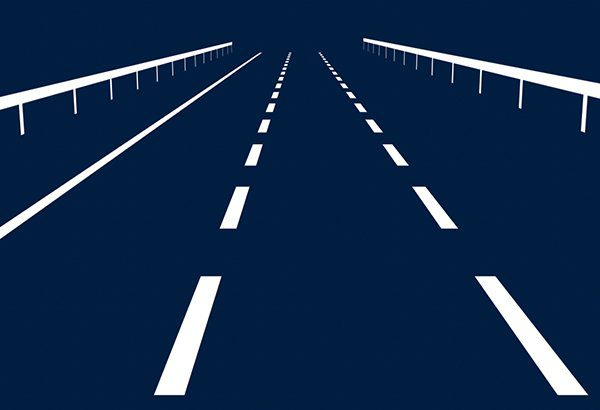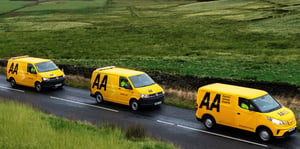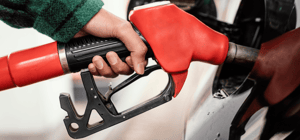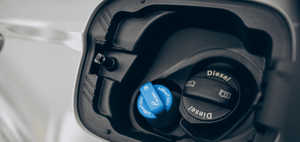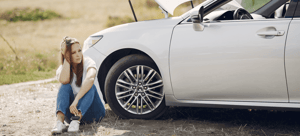Compare cheap breakdown cover
✔ Local, nationwide and European cover options
✔ Compare prices and choose the right policy for you
✔ Cover for cars, vans and motorbikes and scooters


- If you get into trouble on a motorway – go left
- Help keep yourself and others safe
- Get the guidance
- Get the guidance in British Sign Language
- Check your vehicle to prevent a breakdown
- If you need to stop on a motorway with no hard shoulder
- Know your emergency area
- If you break down in a live lane or roadworks
- What to do if you break down in a live lane
- What to do if you have a disability
- Hidden Disabilities Sunflower for your vehicle
- What to do if you have a collision
- Frequently asked questions
If you get into trouble on a motorway – go left
If your vehicle has a problem, or you get into trouble on a motorway, stay calm and try to exit at the next junction or motorway service area. If that’s not possible:
- Put your left indicators on.
- Move into the left lane.
- Enter the next emergency area, or hard shoulder.
- Put your hazard lights on.
- Get behind a safety barrier where there is one – keep well away from moving traffic.
- Call National Highways on 0300 123 5000, then a breakdown provider for help.
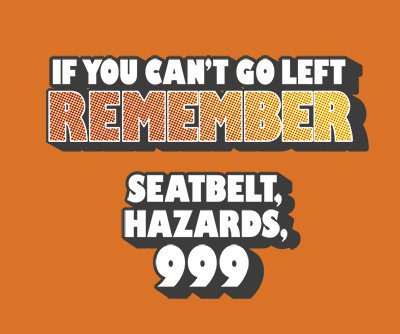
If you are unable to exit your vehicle and get to a safe place, have stopped in a live traffic lane or feel your life is in danger:
- Stay in your vehicle with your seatbelts and hazard lights on
- Call 999 immediately or press the SOS button in your car
Help keep yourself and others safe:
- Always carry details of a breakdown recovery provider with you.
- Put their number and National Highways’ number – 0300 123 5000 – into your phone now.
- If you see a warning light on your vehicle dashboard, don’t ignore it, take action before driving.
It may be safer to stay in your vehicle and wait for help than to get out. If you decide it’s safer to leave, and you can get out with any passengers, exit your vehicle on the side furthest from traffic.
Compare cheap breakdown cover
Get the guidance
What to do in different situations
Our roads are among the safest in the world
We know that many people fear breaking down on a high-speed road, but breakdowns and emergencies on motorways and A roads aren’t that common. In fact, our roads are among the safest in the world.
Drivers travelling at 60mph will typically pass a safe place to stop no more than every 90 seconds.

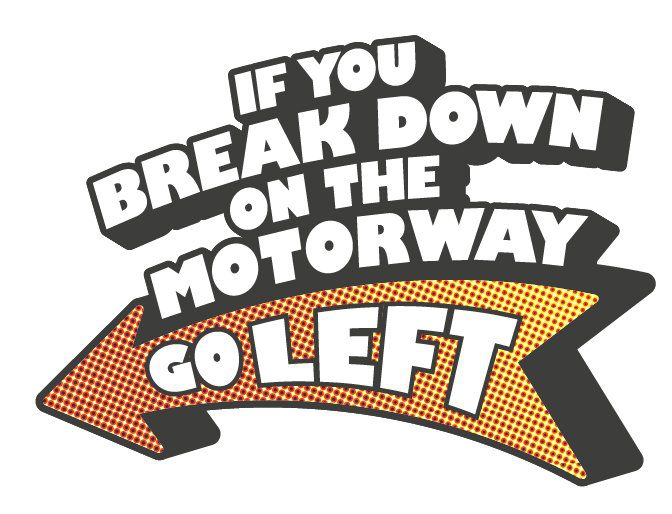
Get the guidance in British Sign Language
Our breakdowns advice in British Sign Language was filmed with the British Deaf Association alongside one of our traffic officers who is learning BSL to better support Deaf road users.
How to contact us if you’re Deaf
If you’re unable to use the roadside phones you can text 0738 028 3600 for roadside assistance.
If you’re a British Sign Language user, you can also use the online interpreting service SignLive to contact us.
Find our more about SignLiveRemember
- Do not stop your vehicle to assist another vehicle that has broken down or been involved in a collision. You may feel you want to help, but it is safer to call National Highways on 0300 123 5000 or 999 for assistance.
- Only use an emergency area or hard shoulder in an emergency.
- Do not put out a warning triangle on a motorway or attempt any repairs on your vehicle because passing traffic may collide with your vehicle.
- Keep well away from moving traffic and your own vehicle. Get behind a safety barrier where possible, and where it is safe to do so.
- If you’re on a verge, be aware of any unseen hazards such as uneven ground or debris.

Check your vehicle to prevent a breakdown
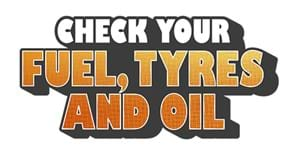
Most breakdowns are avoidable. Around 40,000 breakdowns were recorded as due to tyre issues in the year from June 2019 to May 2020, while more than 6,000 people simply ran out of fuel.
Find out how to prevent a breakdown with our breakdown checklist
“We welcome National Highways’ ‘Go left’ breakdowns campaign. It can be incredibly distressing and dangerous to break down on a motorway and if you should ever find yourself in that situation, ‘knowing what to do’ could be the difference between a safe rescue and something much more serious.”
Damon Jowett, Head of Service Delivery at Green Flag
Compare cheap breakdown cover
If you need to stop on a motorway with
no hard shoulder
Go left
Move left onto a hard shoulder, left-hand verge.
Leave space so that you can get out of your vehicle from the side furthest from traffic.
Try to stop near an emergency telephone; these are spaced at approximately one-mile intervals along motorway hard shoulders.
 Get safe and away from moving traffic
Get safe and away from moving traffic
Switch your hazard warning lights on, even during the day. If it’s dark, use side lights and in poor visibility use fog lights.
If it’s safe and you can get out with any passengers, exit your vehicle via the left-hand door and get behind a safety barrier where there is one. They offer extra protection.
Gather any items you may need, such as your mobile phone, coat, hi-vis clothing, food, drink and medication. Take care if getting items from the boot.
It’s safer to leave pets in your vehicle, even if you think they may become upset. This is because your pet may become scared, run into the traffic and cause a collision. Only remove pets in an emergency. Keep them under proper control on the verge and behind the safety barrier, if there is one.
Keep well away from your vehicle and moving traffic, even if it’s raining, cold or dark.
If you’re on a verge, be aware of any unseen hazards such as uneven ground or debris.
 Get help
Get help
Use the free emergency telephone, which connects directly to one of our regional operations centres and identifies your location. Take care while getting to and from an emergency phone. Stay behind the safety barrier where there is one, and you’re able to do so.
Alternatively, use your mobile phone to call us on 0300 123 5000 if you’re unable to exit your vehicle or get to a free emergency telephone.
We’ll give you further advice based on your circumstances and can help arrange further assistance for you.
After your call to us, contact your breakdown cover provider. They may give you additional instructions.
Get back on the road safely
Build up speed, use your indicators and watch for a gap in the traffic to re-join the carriageway safely. Be aware that other vehicles may be stationary on the hard shoulder or in the lay-by ahead of you.
Know your emergency area
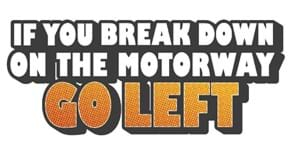
Exit left onto the hard shoulder or A-road lay by.
Put your hazards lights on and get behind a safety barrier where there is one.
If you break down in a live lane or roadworks
 If you’ve stopped in a live traffic lane or in roadworks:
If you’ve stopped in a live traffic lane or in roadworks:
If you can’t get into the left-hand lane, or you can’t exit your vehicle to get to a place of safety, stay in your vehicle, keep your seatbelts and hazard warning lights on and call 999 immediately.
National Highways closely monitors traffic in roadworks, but you must call 999 if you’ve broken down in them. The police will then alert us, so we can work with them to provide a coordinated response.
What to do if you break down in a live lane
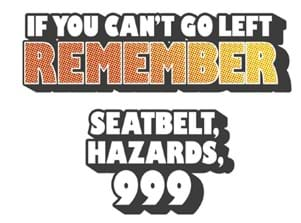
If you can’t get into the left-hand lane, or you can’t exit your vehicle to get to a place of safety, stay in your vehicle, keep your seatbelts and hazard warning lights on and call 999 immediately.
Compare cheap breakdown cover
What to do if you have a disability
Driving on England’s motorways – a disabled driver’s perspective
If you or anyone in your vehicle is unable to follow our breakdown advice for any reason:
- Stay in your vehicle
- Keep your seatbelts and hazard warning lights on
- Call 999 immediately. The emergency services can alert us, so we can close motorway lanes and send other help as required, such as a Traffic Officer
- Tell the operator if you’re disabled and/or a vulnerable motorist such as an older person or travelling alone.
If you’re unable to use the roadside phones you can contact us via text on 0738 028 3600 for roadside assistance.
For British Sign Language users the SignLive service is available.
Always carry any medication you need with you and prepare for your journey in advance
We’ve teamed up with Hidden Disabilities Sunflower to create a free Sunflower for your vehicle.
Displaying the Sunflower indicates that you have a non-visible disability, and may need additional support from traffic officers and others.
It means you’ll get the help you need if you break down on the motorway.
What to do if you have a collision
- Do not stop in a live traffic lane
- Move to a safe place to exchange details. This could be a hard shoulder, emergency area or lay-by
- If you don’t give your details at the time of the collision, report it to the police as soon as reasonably practical, and in any case within 24 hours
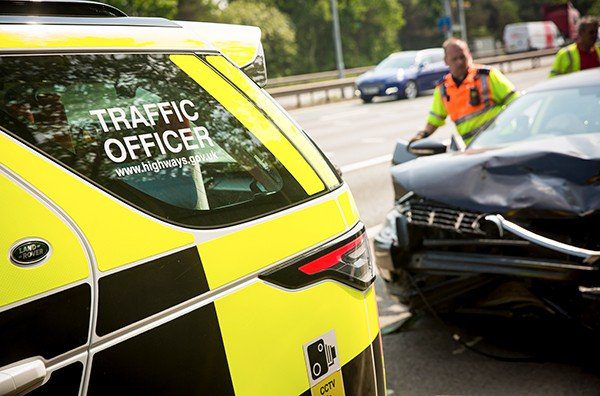
Additional information for those who tow
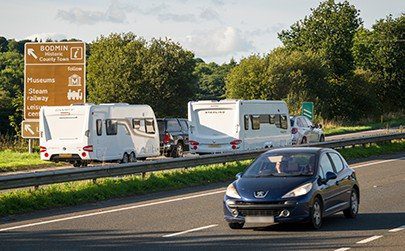
If you tow a trailer, caravan or horse box:
- Connect carefully and check your breakaway cable is secure
- Weigh your load, make sure it is secure and within the manufacturer’s recommended limits of your vehicle and trailer.
- Make sure you have the correct driving licence category and car insurance cover.
Towing a horse box
We understand that breaking down on a motorway or road can be stressful for both drivers and horses. If you need further advice or support from one of our traffic officers call us on 0300 123 5000. In the case of an emergency, always call 999.
The content displayed on this page is authorised under the terms of the Open Government Licence.
Compare cheap breakdown cover
Frequently asked questions
If you break down on a motorway and can’t get to the hard shoulder, stay in your car with your seatbelt and hazard lights on, and call 999. If you’re disabled and unable to leave the car, also stay in your car with your seatbelt and hazard lights on, and call 999.
Driving on the hard shoulder is usually illegal, but there are exceptions. If you’re directed to use it by a traffic police officer or Highways Agency patrol officer, it’s acceptable to drive on the hard shoulder.
National Highways manages and enhances the strategic road network to provide safer, smoother, and more reliable journeys. Their main priorities are safety, customers, and delivery.
To contact National Highways during office hours, which are from 7am to 7pm, call the national switchboard at 0300 123 5000.
Highways England changed its name to National Highways because the new name reflects the company’s role in setting highways standards for the entire UK through the Design Manual for Roads and Bridges.
Although decisions on the construction and maintenance of roads outside of England are devolved to the Scottish government, the term “national” still applies.

